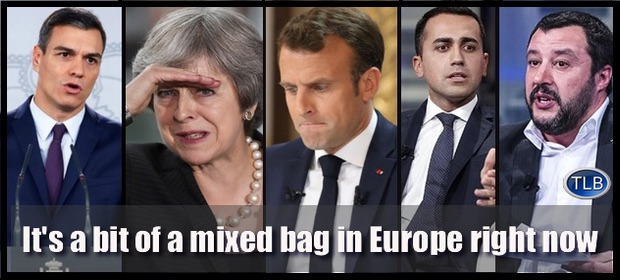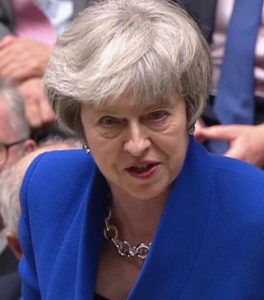
 coalition government:
coalition government:
However, even if Unidas Podemos (left) and PSOE (Sanchez’ party) manage to reach an agreement on building the coalition, they will need to get 11 more seats from small nationalist parties to form the government.
As for the right parties, the Christian democratic People’s Party came second in the election, having received 66 seats in the parliament, the Citizens party has received 57 seats. The right-wing Vox party has received 24 seats.
PSOE secured 123 out of 350 parliamentary seats after almost all votes had been counted. Thus, the party, as it was predicted, failed to obtain an absolute majority of 176 seats to independently approve a prime minister and has to form a coalition with other parties.
********
A Powerless Spain And The Crises Of ‘Old Europe’
Spain’s snap general election is scheduled to take place on 28 April 2019. The Cortes Generales (the Spanish parliament) has been dissolved for the third time in the last four years after a record period of just eight months. The effectiveness of these parliamentary re-elections is questionable, however. Preliminary polls suggest that none of the Spanish parties will win enough votes to obtain a majority in congress. This means that the Spanish people can once again expect a hung parliament.
The political uncertainty in Spain is also noteworthy because it adds to the general picture of crises in ‘Old Europe’: the French authorities are paralysed by the ‘yellow vest’ movement; the populists in Italy are unable to get a single bill through parliament; and the British government is too busy with the never-ending issue of Brexit to pay attention to the problems of continental Europe. Taken together, these crises could not only influence the European elections on 23–26 May 2019, but also shift the balance of power within the European Parliament.
A hung parliament in Spain
The Cortes Generales was dissolved in February 2019 by Spain’s prime minister, Pedro Sánchez, after MPs failed to pass the country’s general state budget. The government had been counting on support from the Catalan parties, but they refused to vote for the budget without a preliminary agreement to begin talks on the independence of their region. It was also rejected by the right-wing opposition. “Between the two options – to do nothing and continue without a budget, or call an election and let the Spanish public decide – I choose the latter,” stated the prime minister.

The government crisis in Spain has been going on for more than a year. Pedro Sánchez became the head of a minority government in June 2018 after the Spanish parliament passed a motion of no confidence in the right-wing government of former Prime Minister Mariano Rajoy. Sánchez, who is the secretary-general of the Spanish Socialist Workers’ Party (PSOE), was able to secure victory thanks to support from the left-wing populist party Podemos, as well as Basque and Catalan separatists. This ill-matched group was unable to operate for long without a common enemy, however, and the eight parties proved incapable of negotiating the day-to-day issues involved in running a country.
Experts predict that new elections will bolster the Socialists’ position in parliament. Prior to the dissolution of the Cortes Generales, the ruling party had the smallest parliamentary representation in the country’s history – just 84 of the 350 seats in the Congress of Deputies and 42 of the 266 seats in the Senate. Controlling less than 25 per cent of parliament, Pedro Sánchez was prevented from implementing draft legislation without the support of other parties, which significantly hampered the government’s work. It is therefore unsurprising that he used the situation with the budget as a formal reason for dissolving the Cortes Generales. Yet early elections are hardly likely to bring the Socialists a landslide victory. As GAD3 polls have shown, just 31.1 per cent of Spaniards questioned support the PSOE – and this is not enough for the party to form a government on its own.
The other parties cannot count on forming an absolute majority in Congress either. According to preliminary polls, the right-wing Citizens party has 14.4 per cent of the vote, the left-wing Podemos party has 11.4 per cent, and the ultra right-wing Vox party has 11.2 per cent. The Socialists’ main rival, the centre-right People’s Party, has 20.1 per cent of the vote, thereby dropping to second most popular party. The People’s Party currently has 134 MPs, but its electorate has been flocking to the Citizens party of late. It is therefore unlikely that the two-party system (the People’s Party and the PSOE) that existed in Spain virtually from the death of the dictator Franco until December 2015 will be revived this time. Either a coalition will have to be formed, which would take time and require mutual political concessions, or there will once again be a minority government, which could result in a vote of no confidence as happened with Mariano Rajoy.
To help the Socialists win a majority of the vote, Sánchez is trying to get the electorate to focus on the problems of consolidating the right, while also blaming it for increased levels of corruption, reduced social assistance, and an inability to stand up to the separatists, The right, in turn, is blaming Sánchez for all this. It is interesting that the arguments being used by both sides are virtually identical. Yet the issue of Catalonia’s independence remains crucial. Should the right manage to competently tap into the demands of the Catalan nationalists, then the balance of power will change dramatically.
However, the creation of duplicate parties in Spain (the Citizens party and the People’s Party, Podemos and the PSOE) is preventing both the left and the right from gaining a majority in Congress since they are effectively splitting the vote. This is due to both the Socialists’ inability to resolve the Catalan issue and the corruption scandals in the previously ruling right-wing People’s Party. As a result, Spain is moving painfully towards a real multi-party system, where minor political forces such as regional left-wing parties and the ultra right-wing Vox party will essentially play a crucial role in the country’s governance.
But none of this would be quite so critical if it weren’t happening amid the crises going on in other European countries on the eve of the European elections.
The problems of ‘Old Europe’
The rules of the European Union state that the allocation of seats in the European Parliament should be proportional to the population of each member state. So in 2014, in accordance with the Treaty of Lisbon, Germany had the most MEPs with 96, then France with 74, Italy and Great Britain with 73 each, then Spain with 54. But with just a month to go until the new elections, the only one of these countries that seems to have a stable political situation is Germany.
France is still in the midst of protests by the ‘yellow vests’, which have virtually occupied Toulouse and proclaimed the city to be the “protest capital”. According to the French Ministry of the Interior, 31,000  demonstrators gathered on the streets last weekend, which is 8,000 more than during the previous protest. However, the ‘Yellow Number’ collective, which is made up of members of the ‘yellow vest’ movement, said that the number of demonstrators was closer to 80,500. The protesters do not trust the authorities and their demands include the resignation of Emmanuel Macron and the dissolution of parliament. The French media are talking about a possible referendum, which the Elysée Palace is allegedly planning to hold on 26 May 2019 – the same day as the European Parliament elections in France. Holding the referendum and the European elections at the same time could dramatically change the outcome of the elections, which typically have a low turnout in France.
demonstrators gathered on the streets last weekend, which is 8,000 more than during the previous protest. However, the ‘Yellow Number’ collective, which is made up of members of the ‘yellow vest’ movement, said that the number of demonstrators was closer to 80,500. The protesters do not trust the authorities and their demands include the resignation of Emmanuel Macron and the dissolution of parliament. The French media are talking about a possible referendum, which the Elysée Palace is allegedly planning to hold on 26 May 2019 – the same day as the European Parliament elections in France. Holding the referendum and the European elections at the same time could dramatically change the outcome of the elections, which typically have a low turnout in France.

The situation in Italy is slightly better, since the country’s government crisis was spearheaded not only by populists, but by real Eurosceptics. The Fitch rating agency is predicting that the coalition government of the third largest economy in the European Union will not be able to last the full length of its term. The problem is that the Italian government is made up of the right-wing Lega Nord party and the left-wing Five Star Movement party, which, due to the fact that they belong to different ends of the party spectrum, disagree on a number of fundamental issues and often block each other’s initiatives in parliament. “They have no idea how to lead and are completely unprepared to work. So far, they have mostly used their time to continue their election campaign,” says Maurizio Ferrera, a political scientist at the University of Milan.
As for Britain, its political system has reached an impasse. The parliamentary crisis is related to Brexit, since MPs have now rejected the draft withdrawal agreement proposed by Prime Minister Theresa May and agreed with the European Union back in November 2018 a total of three times. The original plan was  that Britain would leave the EU on 29 March 2019, after which it would enter into a transition period until the end of 2020. Yet Brexit hasn’t happened. EU leaders have already given an undecided Britain a new deadline of 31 October 2019 and have no intention of extending this further. In this time, London needs to either ratify the withdrawal agreement, revise its Brexit strategy, or reverse its decision to leave. Otherwise, a hard Brexit will automatically take place on 1 November 2019, that is, without any kind of deal for Britain. In addition, London has to participate in the European elections or else it must leave the European Union by 1 June 2019 without a deal. Europe is sick and tired of the protracted divorce proceedings, but none of the EU members want to take responsibility for Britain’s disorderly exit. “When it comes to Brexit, it is like being before the courts or on the high seas; we are in God’s hands,” said the president of the European Commission, Jean-Claude Juncker.
that Britain would leave the EU on 29 March 2019, after which it would enter into a transition period until the end of 2020. Yet Brexit hasn’t happened. EU leaders have already given an undecided Britain a new deadline of 31 October 2019 and have no intention of extending this further. In this time, London needs to either ratify the withdrawal agreement, revise its Brexit strategy, or reverse its decision to leave. Otherwise, a hard Brexit will automatically take place on 1 November 2019, that is, without any kind of deal for Britain. In addition, London has to participate in the European elections or else it must leave the European Union by 1 June 2019 without a deal. Europe is sick and tired of the protracted divorce proceedings, but none of the EU members want to take responsibility for Britain’s disorderly exit. “When it comes to Brexit, it is like being before the courts or on the high seas; we are in God’s hands,” said the president of the European Commission, Jean-Claude Juncker.
Despite the internal political crises that have broken out in the countries of ‘Old Europe’, EU citizens have to elect a new European Parliament in May of this year.
A new European Parliament
The fate of the European Union as a whole all but depends on the outcome of the European elections in May, since the European Parliament plays a key role in shaping EU policies.
This year, the European Parliament could face structural changes related to the trends being observed in individual European countries, first and foremost in the countries of ‘Old Europe’. If large coalitions such as the European People’s Party (right) and the Party of European Socialists do not have an absolute majority after the votes have been counted, then they will have to form new coalitions with smaller factions. This is reminiscent of the situation in Spain, except on a much larger scale. In addition, centrist parties could very well find themselves defeated by right-wing populists, nationalists and Eurosceptics in the forthcoming elections, as has happened in a number of European countries, including Italy. If, in the battle between “Europeans” and “nationalists”, the latter prove victorious, the next European Parliament risks being the most integration-sceptic since 1979.
************
Original article





